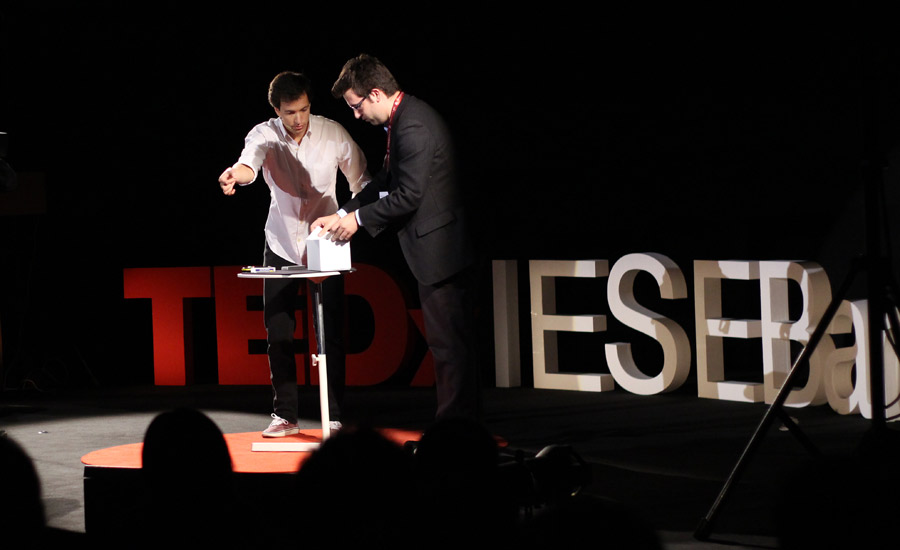
Walk into Wallkill Correctional, a medium-security prison in in the remote city of Shawangunk (New York State). Continue on through its gloomy corridors and you’ll come across a group of 50 inmates. Your mission? To convince them that they could become “the richest people in the world.”
How likely is it, that faced with a challenge of this magnitude, you find out many years later, one of those inmates was so inspired by you that went on to rebuild his life, become an upstanding citizen – and successful businessman?
This is the true story of Vincent Ogutu, professor and vice dean of executive education at Strathmore Business School in Kenya.
It was his capacity make an emotional connection with those prisoners – make them understand that what makes a person “truly rich are qualities like humility, strength and patience” – that worked “a miracle” in Walkill that day.
Ogutu demonstrated the same capacity to connect with people – an audience of more than 300, some via livestreaming, at the first edition of the TEDxIESEBarcelona, organized by students of the IESE MBA Innovation Club.
Eight others speakers also demonstrated the power of a good story to transmit – as the TED slogan puts it – “ideas worth spreading.”
Reaching the Heart
Álex Aranzábal, president of the football club SD Eibar, explained how he was able to turn the fortunes of the third division Spanish team around by “connecting with the spirit” of the Basque community.
“Understanding that we were small and poor gave us the strength and the sincerity to tell our story to the world, and achieve financing through a global crowdfunding campaign.”
IESE Professor of Entrepreneurship and Innovation Tony Dávila shared the story of the milliner who created hats for his grandfather and the men of his generation; a business that went up in smoke when covering your head went out of fashion.
To avoid sharing the milliner’s fate, said Dávila, we have to “focus on what happens outside our organizations.”
“Today’s companies are like cars with enormous dashboards, but tiny windows. What we need are organizations with windows big enough to see outside.”
Farah Yasmine Shakir, specializing in intercultural management on IESE’s doctoral program, shared her personal story – growing up with a need to “continuously explain” her Pakistani-Canadian roots, Arabic name and Jewish ties. In spite of globalization, she said, we are still far from connecting with other cultures.
“The current refugee crisis is a clear example of the lack of connection with other cultures. The only way to overcome this is through the heart. What is most important is the feeling of belonging,” said Shakir.
Solid Ideas
The conference also heard stories from experts in the pioneering fields of environmental sustainability, healthcare and the emerging fintech sector.
Arun Jayadev (MBA '08), cofounder and COO of AM Technology – a company dedicated to mitigating the effects of pollution – opened with an irrefutable argument.
"If you think the economy is more important than pollution, try counting money while holding your breath." His inspirational talk highlighted the impact of pollution inside, as well as outside buildings.
Charles Ehredt, business angel investor and former executive with experience in the Internet sector, led with an idea worth "200,000 million U.S dollars" – the equivalent to electronic transactions that banks do.
“We are on the cusp of a great electronic payments revolution,” says Ehredt, although electronic currencies like Bitcoin are being held back by their inability to reach a shared standard.
Ehredt sees a solution in loyalty programs that combine many companies from different sectors.
IESE scientific collaborator specializing in health management Prof. Magda Rosenmöller, spoke of dance as a remedy to cure or prevent disease – and as a central concept in “curing” healthcare systems which are too focused on the use of high technology to cure disease, as opposed to human connection and the body itself, which dance celebrates.
"Let's dance,” said Rosenmöller, “and let’s dance with the world of healthcare too."
The Surprise Factor
TED conferences are characterized for the element of surprise: sharing new perspectives on established issues.
Carlos García Pont, IESE professor of marketing, surprised the audience with a story on the theme of delegation – and the capacity of senior leaders to rely on committed teams – based on findings from an experiment with executives.
Most claimed to delegate decisions to their middle managers. But, 80 percent of them changed decisions their subordinates made if they didn’t agree – something that 82 percent of the middle managers “hated.”
“We’ve found that 70-80 percent of people wouldn’t like a boss like themselves," said Carlos Garcia Pont. “Be the boss you’d like to have.”
"To achieve this, you need to change the way you distribute responsibility to your team.”
Mariano Torrente (MBA '16), amateur magician and illusionist, brought the conference to a close.
In a talk illustrated with magic tricks and driven by humor, he highlighted how new technologies cause distraction and attention disorders – making it harder for us to concentrate, identify what’s important and experience real enjoyment.
"We urgently need to regain this ability so that we can keep marveling at the wonders of daily life,” he said.
Videos of the TEDxIESEBarcelona talks will be available in coming weeks on the event website.